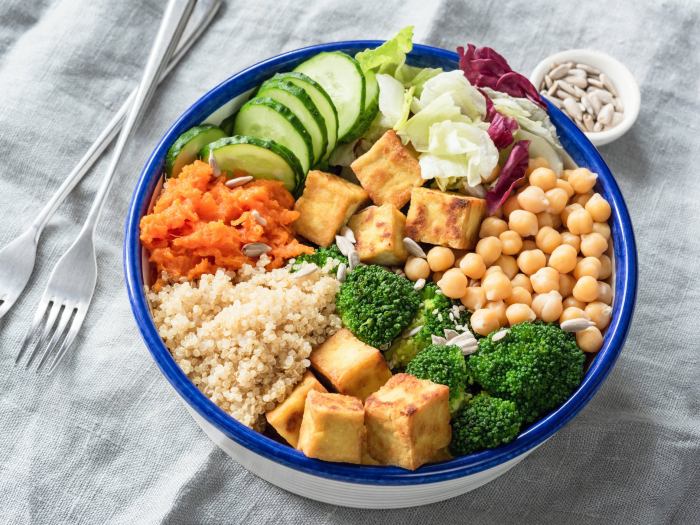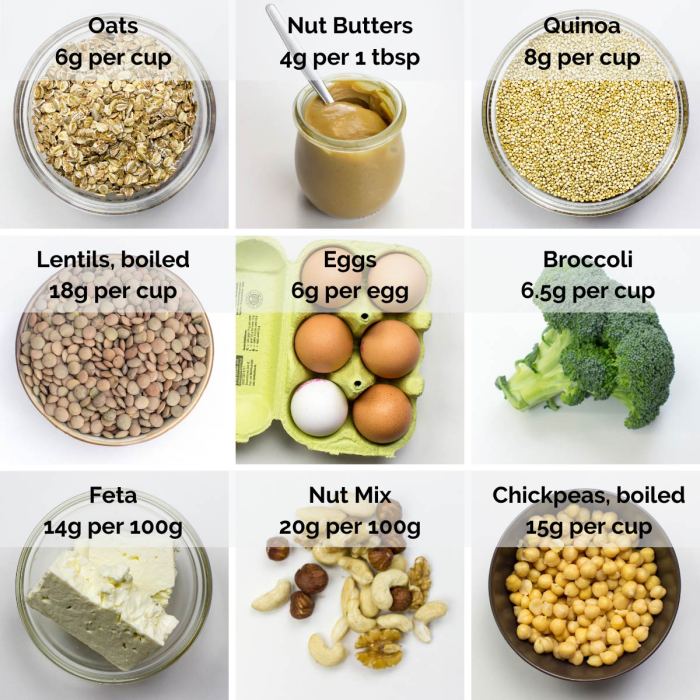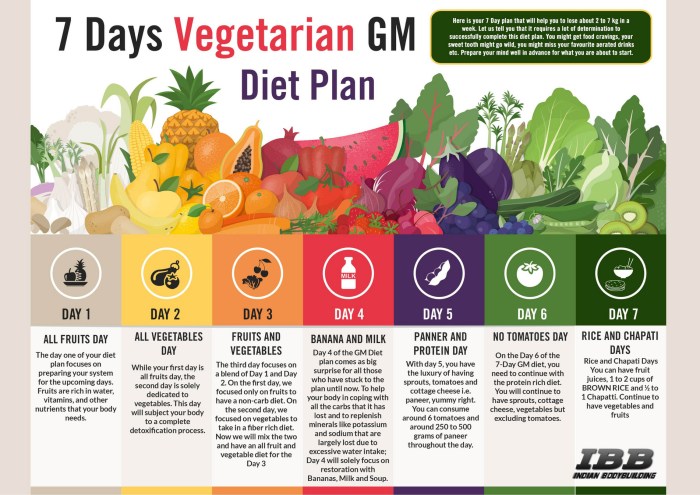Embark on a culinary journey with our good vegetarian diet plan, a comprehensive guide that unveils the secrets of a plant-based lifestyle. Dive into the depths of vegetarianism, exploring its types, benefits, and essential nutrients. Discover the art of meal planning and conquer the challenges that come with adopting a vegetarian diet.
Whether you’re a seasoned vegetarian or just starting your plant-based adventure, this guide will empower you with knowledge and inspiration.
Vegetarian Diet Overview

Vegetarianism is a type of diet that excludes meat (red meat, poultry, seafood, and their by-products) and focuses on plant-based foods. It has been practiced for centuries, driven by religious, ethical, environmental, and health considerations.
There are different types of vegetarian diets, each with varying levels of restriction:
Types of Vegetarian Diets, Good vegetarian diet plan
- Lacto-ovo vegetarian:Consumes dairy products (milk, cheese, yogurt) and eggs in addition to plant-based foods.
- Lacto vegetarian:Consumes dairy products but excludes eggs.
- Ovo vegetarian:Consumes eggs but excludes dairy products.
- Vegan:The strictest form of vegetarianism, excluding all animal products, including dairy, eggs, and honey.
History of Vegetarianism
Vegetarianism has roots in ancient civilizations, particularly in India and Greece. Religious beliefs, such as Hinduism and Buddhism, played a significant role in its development. In the 19th century, vegetarianism gained popularity in Europe and North America as a health and ethical movement.
Meal Planning for Vegetarians

Meal planning is an essential aspect of a healthy vegetarian diet. It ensures that you’re consuming all the nutrients your body needs while enjoying a variety of delicious foods.
Here are some tips for planning balanced and nutritious vegetarian meals:
- Include a variety of protein sources.Plant-based proteins like beans, lentils, tofu, tempeh, and nuts are all excellent sources of protein.
- Eat plenty of fruits and vegetables.Fruits and vegetables are packed with vitamins, minerals, and fiber, all of which are essential for good health.
- Choose whole grains over refined grains.Whole grains are a good source of fiber, which can help you feel full and satisfied.
- Limit processed foods.Processed foods are often high in unhealthy fats, sodium, and sugar.
- Cook more meals at home.This gives you more control over the ingredients in your food and helps you avoid processed foods.
Sample Vegetarian Meal Plan
Here is a sample vegetarian meal plan that provides approximately 2,000 calories per day:
Breakfast:Oatmeal with berries and nuts
Lunch:Lentil soup and a salad with grilled tofu
Adopting a plant-based diet can bring numerous health benefits, but it’s crucial to ensure you’re being a healthy vegetarian. A well-balanced vegetarian diet should include a variety of fruits, vegetables, whole grains, and legumes to provide all the essential nutrients your body needs.
Dinner:Veggie stir-fry with brown rice
Snacks:Fruits, vegetables, nuts, and seeds
Vegetarian-Friendly Recipes
Here are a few vegetarian-friendly recipes to get you started:
Challenges of a Vegetarian Diet

Embarking on a vegetarian diet can be a rewarding endeavor, but it’s not without its potential challenges. Understanding these hurdles and devising strategies to overcome them can ensure a smooth transition and long-term success.
Embracing a vegetarian lifestyle can bring numerous health benefits, including a reduced risk of heart disease and certain types of cancer. Being a healthy vegetarian requires careful planning to ensure adequate intake of essential nutrients, such as protein, iron, and vitamin B12.
With proper nutrition, a vegetarian diet can promote overall well-being and vitality.
One common challenge is ensuring adequate protein intake. Plant-based proteins differ from animal proteins in terms of their amino acid composition, and vegetarians need to pay attention to combining different protein sources to meet their daily requirements.
Meeting Protein Needs
- Incorporate a variety of protein-rich plant foods into your diet, such as beans, lentils, tofu, tempeh, nuts, and seeds.
- Consider adding a plant-based protein powder to smoothies or shakes for an easy way to boost your protein intake.
- Pair complementary proteins, such as rice and beans or peanut butter and whole-wheat bread, to create a complete amino acid profile.
Special Considerations for Vegetarians: Good Vegetarian Diet Plan
A vegetarian diet can provide all the nutrients necessary for good health, but special considerations should be made for certain groups of people, such as pregnant or breastfeeding women, children, and adolescents, and those with specific dietary restrictions.
Pregnant and breastfeeding women have increased nutritional needs, and it is important to ensure that they are getting enough protein, iron, calcium, and vitamin B12. Good sources of protein for vegetarians include beans, lentils, tofu, tempeh, nuts, and seeds. Iron can be found in leafy green vegetables, beans, lentils, and fortified cereals.
Calcium is found in dairy products, leafy green vegetables, and fortified plant-based milks. Vitamin B12 is found only in animal products, so vegetarians need to make sure to eat fortified foods or take a supplement.
Dietary Considerations for Vegetarian Children and Adolescents
Children and adolescents have high nutritional needs, and it is important to make sure that they are getting all the nutrients they need from their diet. Vegetarian children and adolescents should eat a variety of foods from all food groups, including fruits, vegetables, whole grains, legumes, and nuts and seeds.
They should also make sure to get enough protein, iron, calcium, and vitamin B12.
Dietary Considerations for Vegetarians with Specific Dietary Restrictions
Vegetarians with specific dietary restrictions, such as gluten intolerance, need to make sure that their diet meets their individual needs. For example, vegetarians with gluten intolerance need to avoid foods that contain gluten, such as wheat, rye, and barley. There are many gluten-free foods available, such as rice, quinoa, and corn.
Final Thoughts
As you embrace a good vegetarian diet plan, remember that it’s not just about what you eat but also about the positive impact you have on your health, the environment, and the world around you. Embrace the abundance of plant-based foods and let your taste buds dance with the flavors of nature.
With careful planning and a dash of creativity, a vegetarian diet can be a symphony of nutrition, taste, and ethical choices.
Detailed FAQs
Is a vegetarian diet healthy?
Yes, a well-planned vegetarian diet can provide all the essential nutrients your body needs and offers numerous health benefits, including reduced risk of heart disease, stroke, and certain types of cancer.
How do I get enough protein on a vegetarian diet?
Include protein-rich plant foods in your meals, such as beans, lentils, tofu, tempeh, nuts, and seeds. Combining different plant-based protein sources throughout the day can help ensure you meet your protein needs.
Is it difficult to eat out as a vegetarian?
With the growing popularity of vegetarianism, many restaurants now offer vegetarian options. You can also check online reviews or call ahead to inquire about vegetarian-friendly dishes.